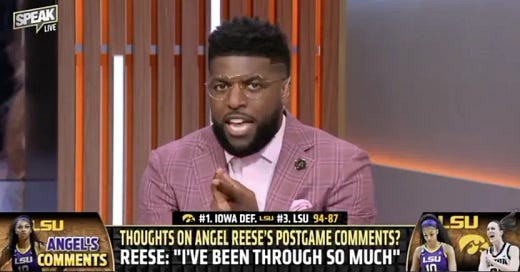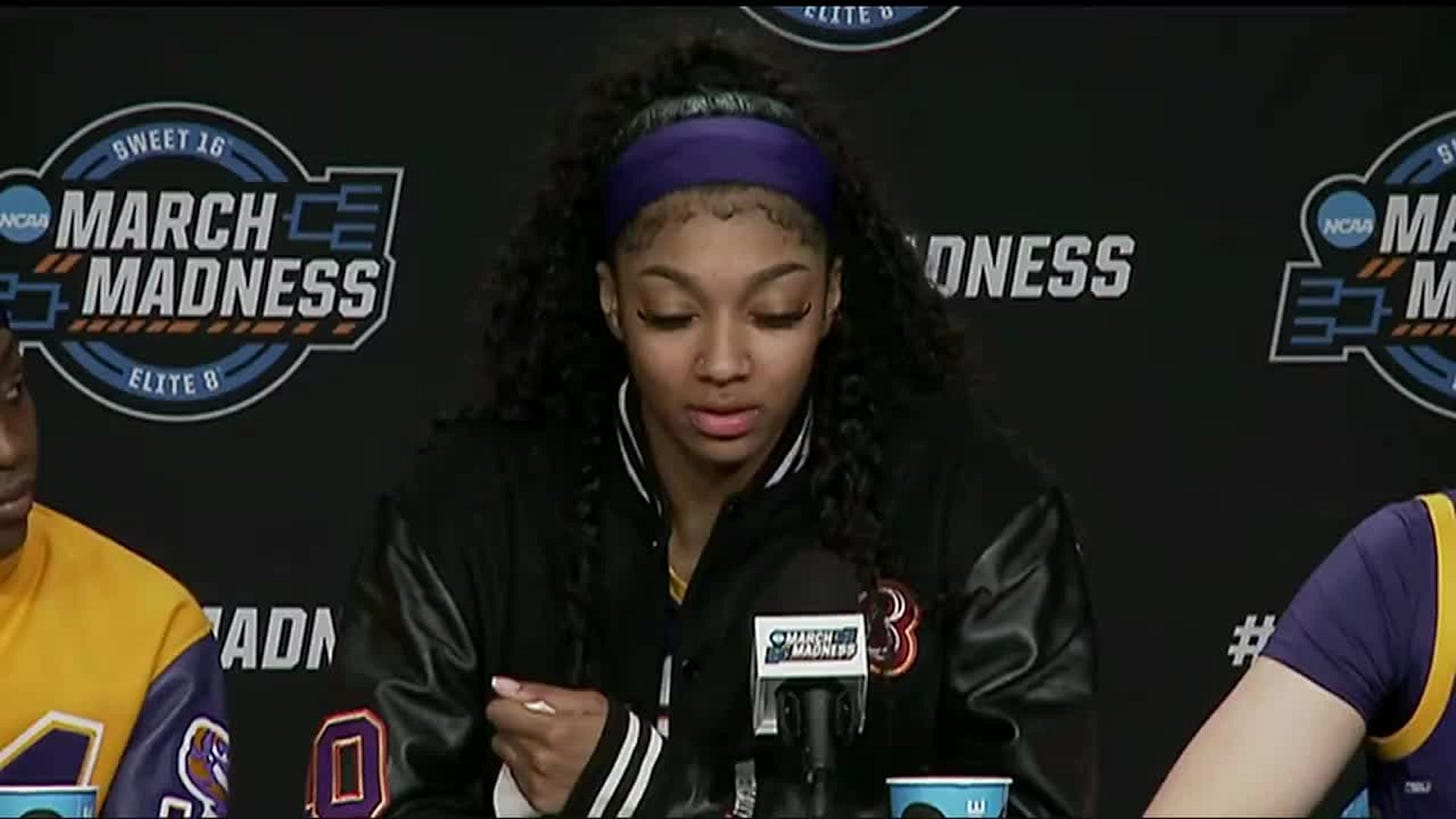You Cannot Offer a "Racially Indifferent" and "Gender-Neutral" Analysis in a Racist, Sexist Society
One Reason Why Emmanuel Acho's Comments about Angel Reese Fell Short
There are a swirl of opinions about the topic below. I want to help you sort through them by offering one, simple analysis. If you find it helpful, would you consider becoming part of the small but essential group of paid subscribers today?
It was the most watched college basketball game ever aired on ESPN.
During the Elite Eight round of the NCAA women’s basketball tournament, more than 12 million people tuned in to watch defending champion LSU and standout Angel Reese versus Iowa and the phenom Caitlin Clark.
While Iowa prevailed over LSU, the post-game conference is what has everyone still talking about that night.
A journalist asked LSU player, Flau’jae Johnson, “Flau’jae if I could hear you on Angel and the type of leadership she’s provided.”
After Johnson passionately defended her and told the media how strong she has been for the past year after being painted the “villain,” Reese herself spoke up.
"I’ve been through so much. I’ve seen so much. I’ve been attacked so many times. Death threats. I’ve been sexualized. I’ve been threatened. There are so many things and I’ve stood strong every single time. I just try to stand strong for my teammates because I don’t want them to see me down and not be there for them. I’m still a human. All of this has happened since I won the national championship. I said the other day I haven’t (been) happy since then.”
After her tearful comments, many talking heads in the sports world chimed in. One of them was former NFL player-turned commentator for Fox Sports 1, Emmanuel Acho.
At the beginning of his remarks, Acho said, “Here’s what I’m about to do. I’m about to give a gender neutral, racially indifferent take.”
Record scratch. Stop right there.
From the moment he said, “I’m about to give a gender neutral, racially indifferent take,” I knew what came after was going to be problematic.
You cannot offer a “gender-neutral, racially indifferent” analysis in a racist, sexist society.
Saying race-neutral is tantamount to saying “colorblind.” Saying gender-neutral is like saying “gender blind.”
Neither is actually possible because we all have biases shaped by our culture and experiences. No one can have a purely “objective” point of view.
Acho went on to say, “Angel Reese you can’t be the Big Bad Wolf, and then kind of cry like Courage the Cowardly Dog.”
He saw her tears and her emotions as she vulnerably revealed the trials—including death threats and sexualization—she’s endured, and told her to “take it on the chin.”
The effect of claiming to extract racial and gender biases from our opinions is more than just wrongheaded, it is harmful to the most marginalized among us.
When you claim to offer a neutral analysis, you end up reinforcing the existing unjust racial and gender norms.
A person floating on the surface of the lake is not truly neutral, they move in whatever direction the waves take them.
It’s the same with our views on society.
If we claim that we’re separating race and gender from our understanding what we’re actually doing is going in whatever direction the waves of our culture take us.
Acho’s comments about Angel Reese have implications beyond a single post-game interview or a commentator’s opinions about it.
The deeper issue our tendency to view ourselves as above and beyond bias—as if we are the only ones in society who can see through the prejudice and partisanship to the “true” nature of the matter.
We cannot divorce ourselves from the culture and context in which we live. And we don’t need to.
It is far more effective to acknowledge the slant in our perspective and take it into account than to deny it altogether.
The most dangerous kind of bias is unconscious bias.
Unconscious bias allows our stereotypes and preferences to affect our opinions without us even knowing. That’s what keeps racism and sexism in place.
We will always have bias, but we can reduce unconscious bias.
Research demonstrates that the first step to countering unconscious bias is recognize that you have it.
In their book, Blindspot: Hidden Biases of Good People, researchers Mahzarin R. Banaji and Anthony G. Greenwald wrote, "Because many biases are not ones of which we are even aware, the act of becoming aware of them is a key first step.”
The goal is to make the unconscious, conscious. To make the implicit, explicit.
Instead of striving to be “gender neutral” we should educate ourselves more about the ways that sexism affects our perceptions.
Instead of trying to be “racially indifferent” we should be “racially conscious” so we perceive the ways racism still functions in our society.
One effective way to become more aware of our unconscious biases is to interact with people who are different from us.
Acho had this experience as the child of Nigerian immigrants. He had to learn about Black American culture from his teammates on sports teams even as he was deeply embedded in white schools and social circles.
In response to the firestorm of criticism he faced for his take on Angel Reese, Acho took to X formerly known as Twitter.
He posted a video in which he explained,
“I just want to say a quick thank you to everyone who has respectfully reprimanded me and offered brilliant opinions on the Angel Reese conversation. I do not believe there is any one way to think about things…I do not stand on a hill saying, ‘I am right, and you are wrong.’ I simply stand on a place saying, ‘Hey this is what I believe. What do you believe? Let’s listen to one another and construct a collective belief.’ So love to everybody who has respectfully reprimanded me and I appreciate it so so so very much.”
Yes. Let’s listen. Let’s learn. And let’s not continue in the idea that we can be race or gender neutral in a society that is decidedly not neutral on those realities.
Let’s use these remarks not to bash a basketball player or a commentator, but to learn more about how much adversity Black women face as women and as Black people.
Let’s learn from Black women and from their own words and reasoning.
At the conclusion of her remarks and even with all the vitriol she has had to endure as a very young woman, Reese was still grateful.
“It sucks, but I still wouldn’t change anything. I would still sit here and say I’m unapologetically me. I’m going to always leave that mark and be who I am and stand on that. Hopefully the little girls that look up to me, hopefully I give them some type of inspiration.





Thanks for your thoughts and continued teaching about unconscious bias. As a white person, growing up in a white middle class area of my town, I am continually noticing and unpacking my unconscious bias around race and your work is one of the ways that I continue to try to bring this to my awareness. As a female I had unconscious bias even against myself as I was socialized to see women's roles as less than. It has been easier for me to move into awareness around gender bias because I have experienced the harm, whereas racial bias feel more insidious because of the privilege I have as a white person. Thanks again for your continued invitations to challenge these biases and the harm they create.
Thanks for your thoughtful perspective. Some of these talking heads would benefit from your mentorship. Every day, I am embroiled in an internal battle between how I was formed and fashioned in my family of origin and who Christ and I want me to be.